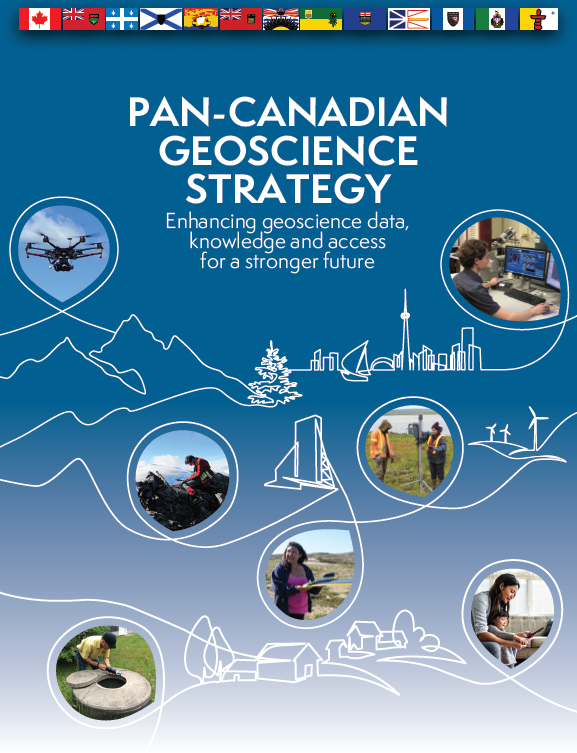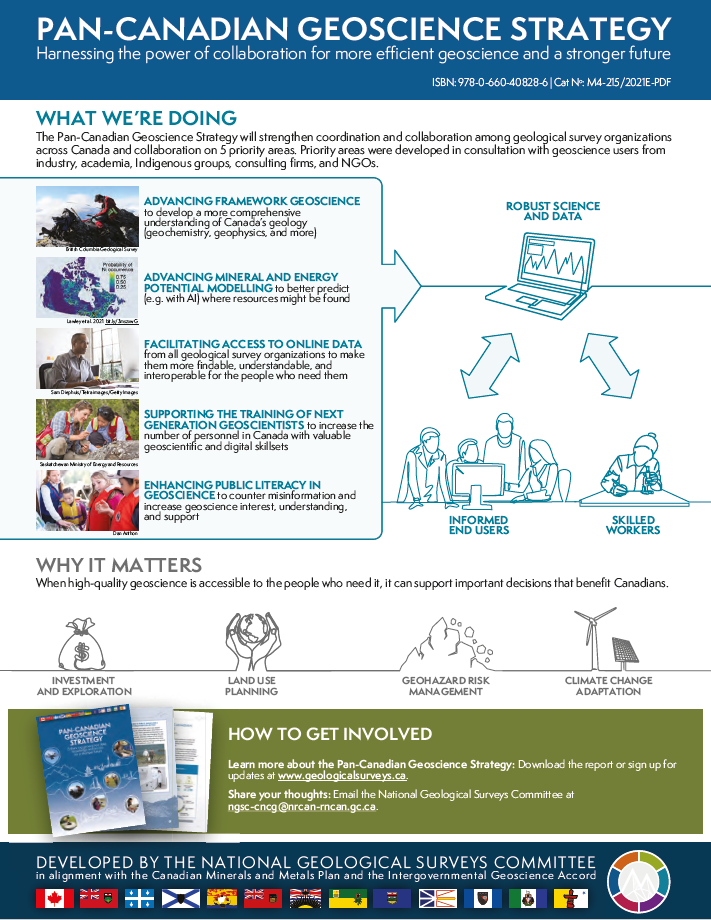Pan-Canadian Geoscience Strategy

The Pan-Canadian Geoscience Strategy (PGS) represents a renewed commitment to federal, provincial and territorial collaboration for delivering accessible geoscience data and knowledge for all Canadians.
It responds to:
- calls from governments and stakeholders to explore options for improving public geoscience coordination and funding
- federal, provincial and territorial Minister commitments under agreements such as the 2017 Intergovernmental Geoscience Accord (9 pages, 2 MB), the Canadian Minerals and Metals Plan and the related Action Plan 2020
Members of the National Geological Surveys Committee (NGSC) have agreed to coordinate their efforts on the following priority areas:
- Advancing framework geoscience
- Advancing mineral and energy potential modelling
- Facilitating access to online data
- Supporting the training of next generation geoscientists
- Enhancing public literacy in geoscience
These priority areas were developed and verified in consultation with a cross-section of stakeholders and Indigenous organizations.
Benefits of the Strategy

The PGS supports a long-term vision to provide geoscience information that underpins the responsible development of Canada’s geological resources (geo-resources) and serves the public good. For example, geoscience can help to:
- inform mineral and energy investment and exploration decisions (benefit: competitive natural resources sector)
- inform sustainable development and land use decisions (benefit: evidence-based conservation)
- understand environmental and public safety risks associated with resource development and geological hazards (benefit: safe infrastructure development)
By providing a diverse, extensive and sound base of evidence, geoscience also enables decision-makers to quickly respond to society’s evolving expectations for responsible land and resource management.
In developing the PGS, the NGSC recognizes that collaboration and coordination can foster greater efficiency and innovation in geoscience. The NGSC also acknowledges that the benefits of geoscience rely on a synergy of robust geoscience and data, skilled workers, and informed end users.
Where we are and where we’re going
The PGS builds on extensive existing geoscience work and collaborations. This work will continue, with enhanced coordination between geological survey organizations, over the coming months and years.
In the past year, the NGSC has advanced the priority areas described in the PGS as follows:
1. Advancing framework geoscience
- Between January and April of 2023, the NGSC held six workshops across Canada to identify region-specific, ranked priorities to advance framework geoscience. Organized by geological region and involving multiple provinces and territories, workshops brought together regional managers and scientists to collaboratively identify pressing knowledge gaps.
- Strategies for addressing these gaps will be explored next.
2. Advancing mineral and energy potential modelling
- A working group will conduct a survey among NGSC members to evaluate the state of mineral and energy potential modelling. The survey aims to gather information on the methods or products currently used for such modelling, gauge interest in updating or modernizing these assessments, and identify any barriers to adopting new approaches.
- Next steps will be to evaluate survey results, identify challenges across jurisdictions and work together to find solutions to these common challenges.
3. Facilitating access to online data
- As part of the continuing work to facilitate access to online data, the NGSC built upon an analysis conducted in 2020–2021 that assessed data readiness for online integration in compliance with international standards.
- Based on the findings of this analysis, a pilot project was initiated. It focused on mineral occurrence data from a subset of Canadian geological survey organizations. A prototype for making such data interoperable was developed in June 2023.
- Next steps are to apply this prototype to mineral occurrence data from across Canada and explore possibilities for expansion to other data types.
4. Supporting the training of next generation geoscientists
- NGSC conducted a preliminary environmental scan of its member organizations to start identifying needs and best practices for hiring and training next generation geoscientists. Findings suggest that geological survey organizations should emphasize fieldwork opportunities for students and address the imbalance between attracting and retaining employees by improving awareness, communication and compensation for geoscience opportunities.
- Next steps will be to develop a list of best practices for hands-on training that should be supported by geological survey organizations and a list of existing training opportunities in each province and territory.
5. Enhancing public literacy in geoscience
- As part of an effort to enhance public literacy in geoscience, a working group conducted an environmental scan of outreach activities taking place across Canadian Geological Survey Organizations.
- For the first time, the working group coordinated efforts to celebrate International Geodiversity Day on October 6, 2023! Established by UNESCO during the 41st General Conference in 2021, International Geodiversity Day marks a worldwide celebration to promote the many aspects of geodiversity.
For more detailed information about PGS implementation so far, check out this year’s NGSC Progress Report (21 pages, 5 MB).
To keep up with PGS news, keep checking this website or sign up to receive updates!
